

On the Origin of Species. Various evolutionary ideas had already been proposed to explain new findings in biology.
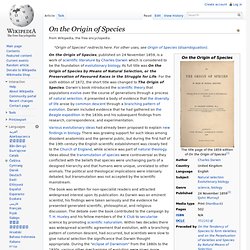
There was growing support for such ideas among dissident anatomists and the general public, but during the first half of the 19th century the English scientific establishment was closely tied to the Church of England, while science was part of natural theology. Ideas about the transmutation of species were controversial as they conflicted with the beliefs that species were unchanging parts of a designed hierarchy and that humans were unique, unrelated to other animals. The political and theological implications were intensely debated, but transmutation was not accepted by the scientific mainstream. Summary of Darwin's theory[edit] Darwin pictured shortly before publication Darwin's theory of evolution is based on key facts and the inferences drawn from them, which biologist Ernst Mayr summarised as follows:[3] Background[edit] Developments before Darwin's theory[edit] Inception of Darwin's theory[edit]
Imagery And Symbolism In T.s. Eliots Poetry - Nidhi Tiwari. Josef Pieper: leisure and its discontents by Roger Kimball. The first principle of all action is leisure.
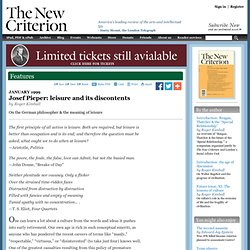
Both are required, but leisure is better than occupation and is its end; and therefore the question must be asked, what ought we to do when at leisure? —Aristotle, Politics The poore, the foule, the false, love can Admit, but not the busied man. —John Donne, “Breake of Day” Neither plenitude nor vacancy. One can learn a lot about a culture from the words and ideas it pushes into early retirement. At first blush, it might seem odd that leisure should survive predominantly in such degraded form today.
Probably the most profound meditation on the meaning of leisure is a little book by the German neo-Thomist philosopher Josef Pieper called in English Leisure, the Basis of Culture. The introduction by Eliot to Leisure, the Basis of Culture—the first of many books by Pieper to appear in English—is one sign of the seriousness with which he was regarded. It is doubtful that this new edition will generate anything like that level of response. Keynesian Economics. Keynesian economics is a theory of total spending in the economy (called aggregate demand) and its effects on output and inflation.
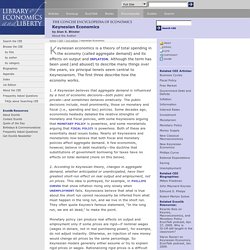
Although the term has been used (and abused) to describe many things over the years, six principal tenets seem central to Keynesianism. The first three describe how the economy works. 1. A Keynesian believes that aggregate demand is influenced by a host of economic decisions—both public and private—and sometimes behaves erratically. The public decisions include, most prominently, those on monetary and fiscal (i.e., spending and tax) policies. 2. Monetary policy can produce real effects on output and employment only if some prices are rigid—if nominal wages (wages in dollars, not in real purchasing power), for example, do not adjust instantly. But Keynesians believe that, because prices are somewhat rigid, fluctuations in any component of spending—consumption, investment, or government expenditures—cause output to fluctuate.
The 'Busy' Trap. Anxiety: We worry.
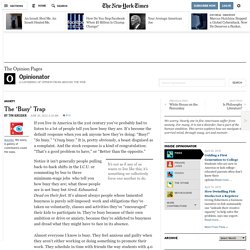
A gallery of contributors count the ways. If you live in America in the 21st century you’ve probably had to listen to a lot of people tell you how busy they are. It’s become the default response when you ask anyone how they’re doing: “Busy!” “So busy.” “Crazy busy.” It’s not as if any of us wants to live like this; it’s something we collectively force one another to do. Notice it isn’t generally people pulling back-to-back shifts in the I.C.U. or commuting by bus to three minimum-wage jobs who tell you how busy they are; what those people are is not busy but tired. Brecht Vandenbroucke Even children are busy now, scheduled down to the half-hour with classes and extracurricular activities. The present hysteria is not a necessary or inevitable condition of life; it’s something we’ve chosen, if only by our acquiescence to it.
Our frantic days are really just a hedge against emptiness. What Work Is Really For. The Stone is a forum for contemporary philosophers and other thinkers on issues both timely and timeless.
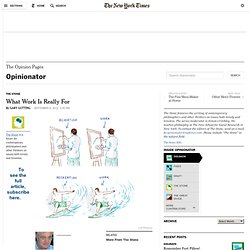
Is work good or bad? A fatuous question, it may seem, with unemployment such a pressing national concern. (Apart from the names of the two candidates, “jobs” was the politically relevant word most used by speakers at the Republican and Democratic conventions.) Even apart from current worries, the goodness of work is deep in our culture. We applaud people for their work ethic, judge our economy by its productivity and even honor work with a national holiday. But there’s an underlying ambivalence: we celebrate Labor Day by not working, the Book of Genesis says work is punishment for Adam’s sin, and many of us count the days to the next vacation and see a contented retirement as the only reason for working.
We’re ambivalent about work because in our capitalist system it means work-for-pay (wage-labor), not for its own sake. Everything depends on how we understand leisure. Leif Parsons.